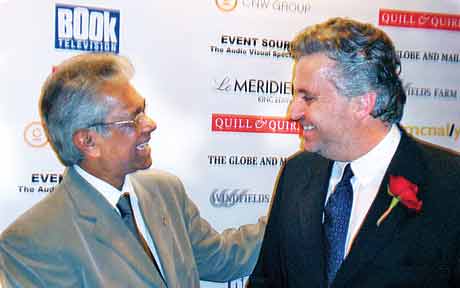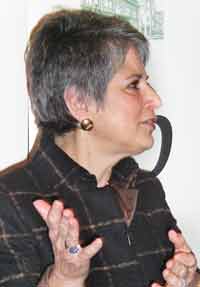Greater Toronto
Canadians are curious … want to know about national past and present - Noreen Taylor

Merrily Weisbord’s “The Love Queen of Malabar: Memoir of a Friendship with Kamala Das” published by McGill-Queen’s University Press, was among this year’s finalists for the Charles Taylor Prize for Literary Non-Fiction.
Charles Foran’s “Mordecai: the Life & Times” was announced winner of the top $25,000 prize Monday afternoon during a Gala Luncheon and Awards Ceremony at the King Edward Hotel, downtown.
Foran said while researching the book he learned about the Quebec author’s kind and loving personality that seemed to be ignored in his tremendously very public life.
The Charles Taylor Prize is the country’s most prestigious literary non-fiction prize. Now in its 10th year, it celebrates Canada’s literary voices, recognizing the exceptional authors and journalists who captivate readers with their stories, insights and writing style. This year the foundation brought back the Inaugural Year Jurors - Neil Bissoondath, Eva-Marie Kroller and David McFarlane to preside over the selection process.
The Charles Taylor Foundation headed by Noreen Taylor presents the prize with the support of its partners: Ben McNally Books, Bravo! and Book Television, CNW Group, Event Source, Indigo Books and Music, Le Meridien King Edward Hotel, Quill & Quire, The Globe and Mail, and Windfields Farm.
Just reading the list of subjects covered by the authors fascinated Taylor because it was an indication of what Canadians wanted to know about. “They showed us that we are a remarkable, curious country wanting to know about ourselves, our diverse communities, our national past and present and what happens within our country and the world at large,” she remarked.
The jury calls “The Love Queen of Malabar: Memoir of a Friendship with Kamala Das” an idiosyncratic account of an unusual cross-cultural friendship between a Canadian documentary filmmaker and a celebrated, controversial Indian poet.

Das is recognized as one of India's foremost poets. Her love of poetry began at an early age through the influence of her great uncle, Nalapat Narayan Menon, a prominent writer. Das remembers watching him "work from morning till night" and thinking that he had "a blissful life".
She was also deeply affected by the poetry of her mother, Nalapat Balamani Amma, and the sacred writings kept by the matriarchal community of Nayars. Das was privately educated until the age of 15 when she was married to K. Madhava. She was 16 when her first son was born and says she was “mature enough to be a mother only when my third child was born".
Her "very understanding" and greatly supportive husband often played a fatherly role for Das and her sons. Because of the great age difference between Kamala and Madhava, her husband, he often encouraged her to associate with people of her own age.
Das’ husband was at her side, even when controversy swirled around her sexually charged poetry and her unabashed autobiography, “My Story”. He was "very proud" of her. Though he was sick for 3 years before he passed away, his presence brought her tremendous joy and comfort. There shall not be another person so proud of me and my achievements, she stated.
Das published many novels and short stories in English, as well as in the Indian language of Malayalam under the name "Madhavikutty" Some of her more recent novels in Malayalam include Palayan (1990), Neypayasam (1991), and Dayarikkurippukal (1992).
The other short listed authors were Stevie Cameron – On the Farm: Robert William Pickton and the Tragic Story of Vancouver’s Missing Women; Ross King’s Defiant Spirits: The Modernist Revolution of the Group of Seven and George Sipos, The Geography of Arrival: A Memoir. They were selected from more than 150 submissions, which fascinated Noreen Taylor, foundation chair who termed the number an explosion in quantity and quality of books. Forty-four large and small publishing companies from across the country submitted books.
The authors talked about their projects and read from their works at a special instalment of The Globe and Mail/Ben McNally Authors’ brunch Sunday morning at the Le Meridien King Edward Hotel, downtown.
Originally awarded every two years, since 2004 the practice changed to annually. Judges look for the Canadian author whose book best demonstrates a superb command of the English language, an elegance of style and a subtlety of thought and perception.
The Prize commemorates the late Charles Taylor, one of Canada’s foremost essayists, foreign correspondent and a prominent member of the Canadian literary community whose dream was to raise the public profile of non-fiction.